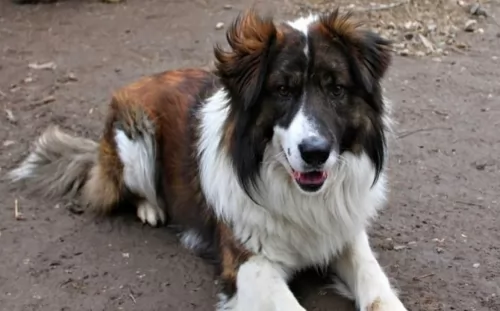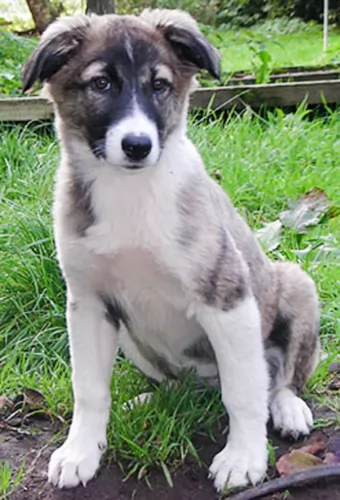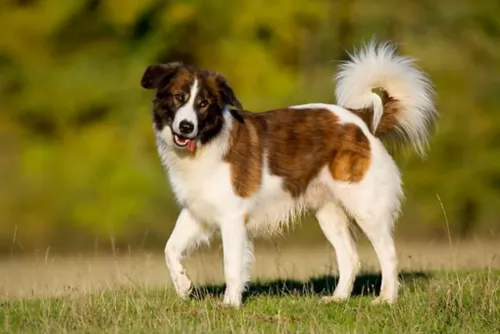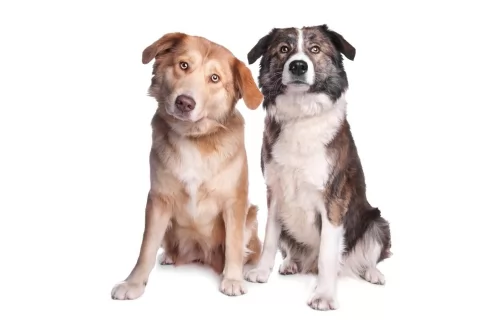 Petzlover
Petzlover Aidi is originated from Morocco but Borzoi is originated from Bosnia and Herzegovina. Aidi may grow 24 cm / 9 inches shorter than Borzoi. Aidi may weigh 22 kg / 48 pounds lesser than Borzoi. Both Aidi and Borzoi has almost same life span. Aidi may have less litter size than Borzoi. Aidi requires Low Maintenance. But Borzoi requires Moderate Maintenance
Aidi is originated from Morocco but Borzoi is originated from Bosnia and Herzegovina. Aidi may grow 24 cm / 9 inches shorter than Borzoi. Aidi may weigh 22 kg / 48 pounds lesser than Borzoi. Both Aidi and Borzoi has almost same life span. Aidi may have less litter size than Borzoi. Aidi requires Low Maintenance. But Borzoi requires Moderate Maintenance
 Aidi dog is also known as Berber dog. It originates from Marocco, where it has been kept to protect people from wild animals, strangers, and predators. It is considered that this breed has been utilized by the Barber tribe that is why it has a name Barber dog. Aidi has recently been protected by a club to keep its purity of the breed.
Aidi dog is also known as Berber dog. It originates from Marocco, where it has been kept to protect people from wild animals, strangers, and predators. It is considered that this breed has been utilized by the Barber tribe that is why it has a name Barber dog. Aidi has recently been protected by a club to keep its purity of the breed.
 Developed in Russia and also known as the Russian Wolfhound, the Borzoi was used to hunt wolf in the country. By 1873 there were only a few Borzoi which remained, and the Imperial Association was created to protect this graceful, elegant dog. They were often presented to European nobility as gifts, and thanks to a few dedicated breeders, the breed was saved from extinction and exported to other parts of the world. He was imported to the UK in the late 19th century, and it was Princess Alexandra who did a lot to increase the dog’s popularity in Britain.
Developed in Russia and also known as the Russian Wolfhound, the Borzoi was used to hunt wolf in the country. By 1873 there were only a few Borzoi which remained, and the Imperial Association was created to protect this graceful, elegant dog. They were often presented to European nobility as gifts, and thanks to a few dedicated breeders, the breed was saved from extinction and exported to other parts of the world. He was imported to the UK in the late 19th century, and it was Princess Alexandra who did a lot to increase the dog’s popularity in Britain.
The tall, slender, elegant dog was recognized by the AKC in 1891. The Borzoi Club of America, which started off being known as the Russian Wolfhound Club was formed but in 1936 the name was changed to Borzoi. The Russian world ‘Borzoi’ is a term used to encompass all Sight Hounds. Today he is no longer used for hunting but is a gentle companion.
 Aidi dog originate country is Morocco.
A weight of the Aidi dog is 23-25kg while the height is 53-61cm. Female dogs are a little smaller than average males.
Lifespan variates from 10-12 years, but it depends on every individual.
Litter Size of Aidi is 5-8 puppies.
Other Names for Aïdi are Atlas Mountain Dog, Atlas Shepherd Dog, Berber Dog, Chien de l'Atlas, Chien de Montagne de l'Atlas, Kabyle Dog.
Aidi dog originate country is Morocco.
A weight of the Aidi dog is 23-25kg while the height is 53-61cm. Female dogs are a little smaller than average males.
Lifespan variates from 10-12 years, but it depends on every individual.
Litter Size of Aidi is 5-8 puppies.
Other Names for Aïdi are Atlas Mountain Dog, Atlas Shepherd Dog, Berber Dog, Chien de l'Atlas, Chien de Montagne de l'Atlas, Kabyle Dog.
 The Borzoi’s silky coat is longer with the male dogs than with the females. The height of these tall graceful dogs is 68 to 74cm. You’ll find that the Borzoi’s back is quite bony and it rises in a curve. He has a tall, lean body and a long, narrow head to match with small, thin ears which rest backwards towards the neck.The silky coat comes in a number of colors - tan, white, black or a mix such as sandy and white or tan and white. The coat is often wavy or slightly curly. The soft undercoat becomes thick in the Winter and he sheds this hair in hotter weather. You’ll find the coat frills on the neck and there is feathering on the hindquarters and with the long tail.
The Borzoi’s silky coat is longer with the male dogs than with the females. The height of these tall graceful dogs is 68 to 74cm. You’ll find that the Borzoi’s back is quite bony and it rises in a curve. He has a tall, lean body and a long, narrow head to match with small, thin ears which rest backwards towards the neck.The silky coat comes in a number of colors - tan, white, black or a mix such as sandy and white or tan and white. The coat is often wavy or slightly curly. The soft undercoat becomes thick in the Winter and he sheds this hair in hotter weather. You’ll find the coat frills on the neck and there is feathering on the hindquarters and with the long tail.
The Borzoi is a gentle, sweet dog, to such an extent that they don’t make good watch-dogs. He is good with other pets and children, although he isn’t the kind of dog to indulge in games with children. He doesn’t bark much and he is also not a high-energy dog, being fairly happy to make himself at home indoors. This is a faithful, loyal and courageous dog.
His temperament is quiet, sensitive, intelligent and somewhat aloof. Even though he has these quiet characteristics, he will still need training and socialization as this just rounds your dog off, making him a pleasure to have around.
 Aidi is an active dog who loves spending time outside in large space. They are not recommended for people who live in the apartments. They are very protective dogs, so they will be a perfect guard dog for large houses.
Aidi is an active dog who loves spending time outside in large space. They are not recommended for people who live in the apartments. They are very protective dogs, so they will be a perfect guard dog for large houses.
They are amazing with children. Aidi is a very gentle to small kids, and they tend to bond very quickly. It is very important to socialize them on time because they tend to be aggressive towards other animals and people if not properly trained. The best way to socialize them is to spend time with other pets since the early age.
Training of the Aidi might be tricky because it requires constancy and patience. It is also very important to be a firm but without any aggression towards a dog. Awarding and positive training is a must with this breed.
One of the most important things is that Aidi needs to spend a lot of time being active. They need a lot of space to be comfortable even though they do not need a lot of running.
They are very smart dogs who come from a history of guarding dogs, so proper socialization is a must. Aidi is not recommendable for the first time owners. They need a lot of practice and training to be a perfectly good pet.
 If you’re looking for a quiet, amicable, elegant breed, you’ll love the big Russian Borzoi, known for his gentleness, sweetness and gracefulness. He is a friendly dog with his human family, although not too keen on children with their boisterous games. It is his gentleness however, that has endeared him to so many dog lovers.
If you’re looking for a quiet, amicable, elegant breed, you’ll love the big Russian Borzoi, known for his gentleness, sweetness and gracefulness. He is a friendly dog with his human family, although not too keen on children with their boisterous games. It is his gentleness however, that has endeared him to so many dog lovers.
Even though he isn’t one of the most active dogs, he will still need exercise and a walk as he is a big dog used to wide, open spaces. He’ll need the opportunity every now and then to simply run.
He makes a wonderful pet for new- or seasoned pet owners, and if you’re looking for a quiet, devoted companion, why not welcome an elegant, graceful Borzoi into your home?
 The Borzoi is a healthy dog, and you’re not likely to be taking him to the veterinarian often but you do need to know about illnesses which are more prevalent in these large breed dogs.
The Borzoi is a healthy dog, and you’re not likely to be taking him to the veterinarian often but you do need to know about illnesses which are more prevalent in these large breed dogs.
This is a common bone tumor found in dogs and it is more commonly found in large breeds. It can spread quickly to other parts of the body, and although there are treatments, the long term prognosis isn’t good. Your dog will have pain and swelling.
Lymphosarcoma is a common cancer diagnosed in dogs. It is a cancer of lymphocytes and the average dog gets it from 6 years on. Some dogs may not necessarily feel sick, while others are tired, they don’t eat, they lose weight and may have diarrhea.
This is a disease that can be deadly for your dog. Known as gastric dilatation, the stomach twists and fills with gas, putting pressure on the diaphragm, and creating breathing problems. Bloat is more common in large breeds and its up to you as a responsible dog owner to watch out for a swollen stomach with drooling and attempts to vomit.
Remember that some health problems are inherited, but there are other health problems that can be prevented by the way you treat- and raise your dog.
 Feeding Aidi dog depends on the activity and size of each individual. Overall, for a medium-sized dog with average activity 2-2.5 cups of high-quality food would be enough, but if your dog is a very active dog, you should give him extra food. They love eating, so giving your dog healthy fruit and vegetables would be a very nice treat and addition to dry food. Olive oil is also very good for your dog’s coat and digestive system.
Feeding Aidi dog depends on the activity and size of each individual. Overall, for a medium-sized dog with average activity 2-2.5 cups of high-quality food would be enough, but if your dog is a very active dog, you should give him extra food. They love eating, so giving your dog healthy fruit and vegetables would be a very nice treat and addition to dry food. Olive oil is also very good for your dog’s coat and digestive system.
Puppies need to have more meals per day, so dividing 3-4 cups of food into 3-5 meals per day should be a good amount of food for your puppy. Also, regular intake of vitamins and minerals would do a lot of benefits for the health of your dog.
Aida is a very easy dog for grooming. They have a coat that really needs a little extra attention. Few brushing on a monthly basis with an occasional bathing couple of times a year would be enough to have a perfectly groomed dog. They don’t shed a lot, so little extra brushing during the shed period is all you need.
 Long coated dogs shed, and the Borzoi female sheds after her season and the males shed annually. Once the female is spayed, she sheds like the males. You will need to be brushing your Borzoi every day to rid the dogs of this loose hair.
Long coated dogs shed, and the Borzoi female sheds after her season and the males shed annually. Once the female is spayed, she sheds like the males. You will need to be brushing your Borzoi every day to rid the dogs of this loose hair.
Borzoi teeth collect tartar, more so than with other breeds, so their teeth will need to be brushed at least 3 times a week with special dog toothbrushes and toothpaste to prevent gum and tooth problems.
Good quality food is the foundation for good health with your pet. Home-made food is always good for your dog and should include meat, rice and vegetables. Apart from top quality commercially manufactured food for large breed dogs and recommended by your vet, make sure to include some raw meat into your Borzoi’s diet too. This is imperative to stave off ill health and skin problems. Make sure he has a constant supply of fresh, cool water available to him.